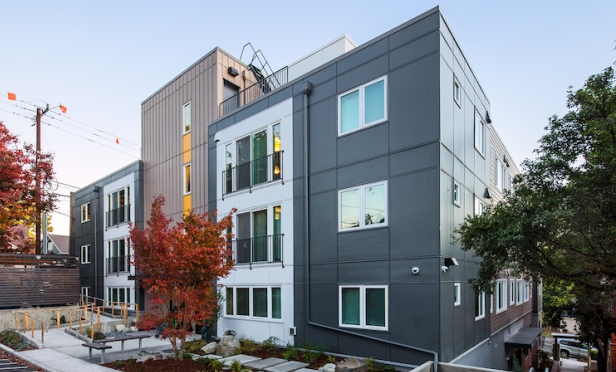 Mt. Baker Village Apartments is a transit-oriented development two blocks from a light rail station.
Mt. Baker Village Apartments is a transit-oriented development two blocks from a light rail station.
SEATTLE—Mt. Baker Village Apartments, located at 2900 McClellan St., was built in 1957 as garden-style market rate apartments. Seattle area nonprofit affordable housing developer Mt. Baker Housing was formed in the late 1980s to purchase the poorly maintained property, which at the time, left hundreds of refugee families in unsafe conditions. Its residents, then as now, are largely Southeast Asian Cambodian and Vietnamese refugees who relocated to the Seattle area in the 1960s and 1970s.
Mt. Baker Housing tackled the community redevelopment project and transformed the existing four-story seven-building Mt. Baker Village Apartments into a transit-oriented development two blocks from the Mt. Baker light rail station. It includes 156 one-, two-, three- and four-bedroom apartment homes affordable at 30 to 60% area median income. At the time, Mt. Baker Housing's 1988 renovation represented an early use of the low-income housing tax credit program in Washington State.
The latest renovations, designed to ensure the project remains affordable for decades to come, include fully updating the existing 107 one-, two-, three- and four-bedroom units, and upgrading common spaces including the community kitchen/entertainment rooms and gathering lounge. Additionally, Mt. Baker Housing also acquired a small neighboring property as part of the project, which allowed the construction of an additional 49 new units to meet the needs of Seattle's aging population, including accessible units and a new elevator.
In addition to its large scope of construction and renovations, financing for the Mt. Baker Village project was also unique with the firm, creatively using debt, tax credit equity and seller note funds. Mt. Baker Housing was also one of the first Seattle firms to utilize a new HUD program to leverage more debt.
“I'm incredibly proud of the unique and innovative nature of the financing for Mt. Baker Village,” said Conor Hansen, director of real estate at Mt. Baker Housing. “A project of this size almost always requires public support; however, in this project, we were able to move forward without utilizing any additional public funds beyond those already committed to the project in the 1988 renovation.”
Additionally, financing partners included National Equity Fund, Union Bank, Washington State Housing Finance Commission, Seattle Housing Authority, Seattle Office of Housing and Mt. Baker Housing.
Since its 1988 inception, Mt. Baker Housing has developed seven low-income/affordable housing properties which it now owns and operates. But its namesake project, Mt. Baker Village, started it all.
“Mt. Baker Village is our namesake. It was the project for which the local community created Mt. Baker Housing 30 years ago,” says Mike Rooney, executive director at Mt. Baker Housing. “We are proud of the legacy of Mt. Baker Village, in particular that it is home to an important segment of Seattle's Southeast Asian community. We are very happy that with the completion of this project we're able to contribute to keeping intact a very special and important Seattle community.”
Project team members for Mt. Baker Village included Mt. Baker Housing (developer), Rafn Company (general contractor) and ARC Architects (architect, interior designer) and Beacon Development Group (development consultant). Construction is expected to be fully complete by October 2019.
“At Mt. Baker Housing, we believe that individuals and families should not have to choose between basic necessities and paying rent, and are committed to improving lives and strengthening communities through quality affordable housing,” Hansen tells GlobeSt.com. “With the completion of this important project, Mt. Baker Village will continue to be affordable for decades to come.”
The Mt. Baker Village preservation project has been recognized by Affordable Housing Finance as a 2019 finalist.
“Being acknowledged on a national scale for our efforts is a tremendous honor,” said Rooney. “This project's broad scope and unique financing along with the tenant coordination involved make it likely one of the most complex projects we'll ever complete.”
A billion more people are projected to live in cities by 2030, and as e-commerce continues to expand, urban freight volumes are projected to grow 40% by 2050. The national proposal by the US Department of Transportation, Smart City Challenge, includes road sensors that provided real-time traffic updates as well as dynamic speeds for large trucks. Seattle created its Urban Freight Lab in 2016, producing promising results with centralized drop-off lockers to reduce the amount of deliveries citywide.
© Touchpoint Markets, All Rights Reserved. Request academic re-use from www.copyright.com. All other uses, submit a request to [email protected]. For more inforrmation visit Asset & Logo Licensing.







